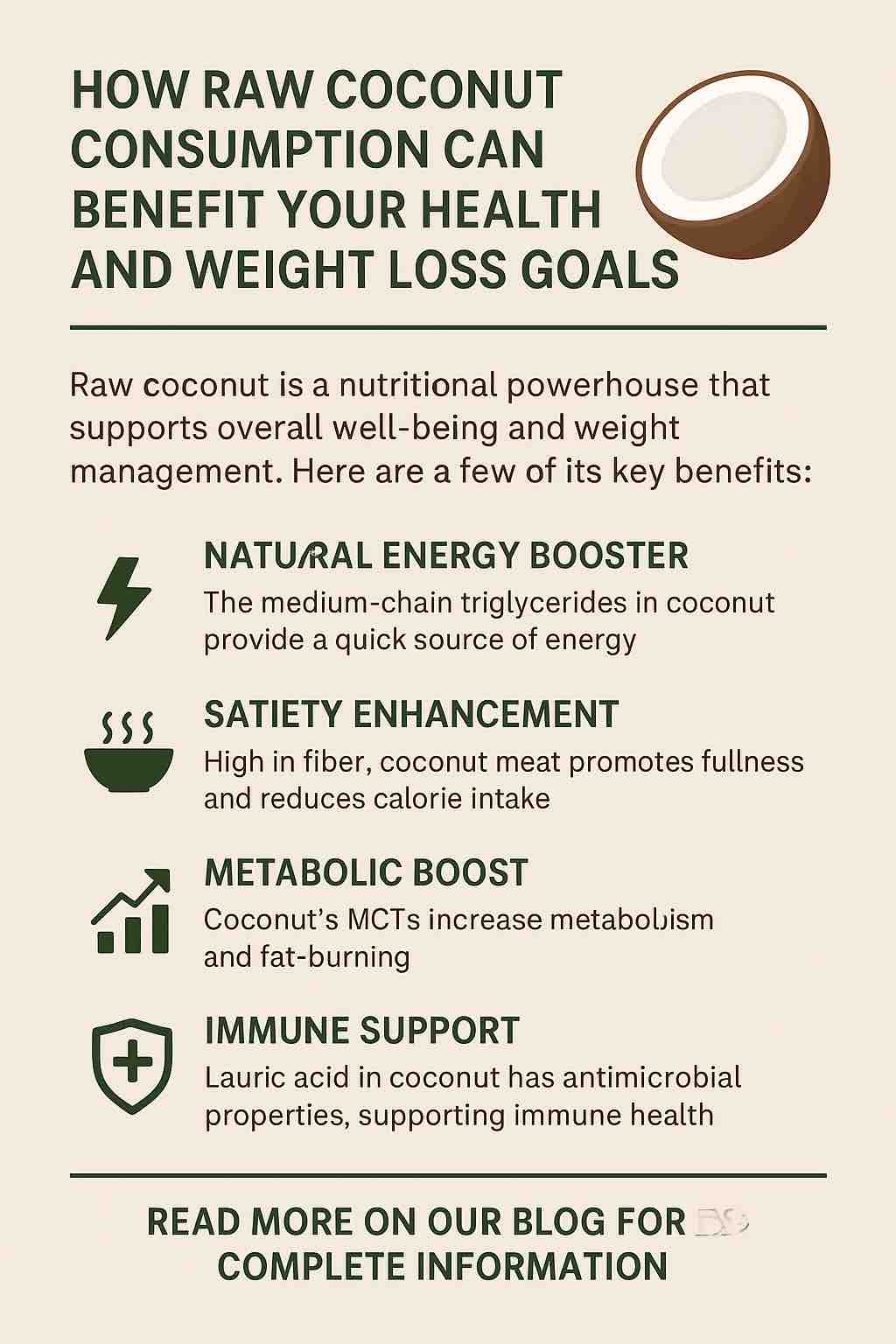
In the quest for better health and sustainable weight loss, nature often holds the most powerful solutions. One such gift from nature is the humble raw coconut—a tropical treasure revered for its rich flavor, diverse applications, and, most importantly, its exceptional nutritional profile. Often consumed in its processed forms like oil or milk, raw coconut—especially its meat and water—deserves the spotlight for those seeking natural, wholesome ways to fuel their wellness journey.
In this article, we unlock the powerful health and weight loss benefits of raw coconut, demystifying its components, nutritional impact, and practical ways to include it in your daily life.
🥥 The Nutritional Composition of Raw Coconut: More Than Just Fat
Raw coconut includes both the white meat (flesh) and the clear water inside. Each part offers unique health benefits:
1. Coconut Meat
- Calories: ~354 per 100g
- Healthy Fats: ~33g (mostly medium-chain triglycerides or MCTs)
- Fiber: ~9g
- Protein: ~3.3g
- Rich in: Manganese, copper, selenium, phosphorus, and potassium
2. Coconut Water
- Calories: ~18 per 100ml
- Natural Electrolytes: Potassium, sodium, magnesium
- Hydration Boost: Low in sugar and fat
Far from being a simple indulgence, raw coconut delivers a dense concentration of essential nutrients that support various biological functions—from metabolism and digestion to cellular repair and immune defense.
🌿 Health Benefits of Raw Coconut
Let’s explore how this tropical superfood enhances overall wellness.
🔋 1. Natural Energy Booster
The MCTs in coconut meat are metabolized quickly by the liver and used as an immediate energy source. Unlike long-chain fats, they’re less likely to be stored as body fat, making coconut a smart fuel for active lifestyles.
🧠 2. Supports Cognitive Function
MCTs also play a role in brain health. They can serve as an alternative energy source for the brain, particularly beneficial in neurodegenerative conditions like Alzheimer’s, though more research is ongoing in this area.
🛡️ 3. Immune-Enhancing Properties
Raw coconut contains lauric acid—a compound with antimicrobial, antiviral, and antifungal properties. Once consumed, lauric acid converts to monolaurin, which may help the body fight off pathogens.
💧 4. Promotes Hydration
Coconut water is often dubbed “nature’s sports drink.” With high potassium and low sugar, it replenishes electrolytes effectively without the artificial ingredients found in commercial sports drinks.
❤️ 5. May Improve Heart Health (In Moderation)
Although coconut is high in saturated fats, emerging research suggests that MCTs may increase HDL (“good”) cholesterol while maintaining or even lowering LDL (“bad”) cholesterol in some individuals.
⚖️ Raw Coconut and Weight Loss: A Surprisingly Effective Ally
Despite its richness, raw coconut can play a meaningful role in weight loss—if consumed strategically.
🧬 1. Boosts Metabolism
MCTs have a thermogenic effect, meaning they increase the number of calories your body burns at rest. Studies show that MCTs can increase metabolic rate by up to 5%, potentially aiding fat loss over time.
🍽️ 2. Increases Satiety
The combination of healthy fat and fiber in coconut meat helps regulate appetite. Eating a small portion of raw coconut can leave you feeling full longer, reducing the urge to snack unnecessarily or overeat at meals.
🔄 3. Supports Stable Blood Sugar
With a low glycemic index and high fiber, coconut meat can help moderate blood sugar spikes, making it a smart snack for people with insulin sensitivity or Type 2 diabetes.
🚽 4. Improves Digestive Regularity
The fiber in raw coconut (both soluble and insoluble) promotes healthy bowel movements, aiding detoxification and reducing bloating—often a hidden barrier to visible weight loss.
👩🍳 How to Add Raw Coconut to Your Diet
Raw coconut is incredibly versatile and can be used in both sweet and savory dishes. Here are some simple ideas:
💡 Snack Ideas
- Fresh coconut cubes with sea salt and lime
- Mix with berries and seeds for a tropical trail mix
- Add to energy bites with dates, oats, and nut butter
🥤 Smoothie Booster
- Blend coconut meat with banana, spinach, and coconut water for a fiber-rich green smoothie
🍲 Meal Enhancer
- Grate fresh coconut over curries, stir-fries, or salads
- Add shredded coconut to whole-grain porridge or Greek yogurt
🧁 Healthy Desserts
- Use raw coconut to create no-bake treats, coconut cream puddings, or frozen fruit bars
⚠️ Precautions and Considerations
While coconut is a natural and nutrient-dense food, it’s essential to consume it in moderation, especially for those watching their saturated fat intake or calorie levels. Here are a few tips to stay balanced:
- Portion Control: Limit to ¼ to ½ cup of raw coconut meat per serving
- Balance with Whole Foods: Combine with high-fiber vegetables, lean proteins, and complex carbs
- Monitor Cholesterol: If you have cardiovascular concerns, consult a healthcare provider before adding large amounts of coconut to your diet
🌴 Final Thoughts: Embracing the Whole Coconut Lifestyle
Raw coconut is not just a tropical treat—it’s a nutritional powerhouse packed with health-boosting compounds that can support everything from energy metabolism to appetite control. Whether your goal is to shed a few pounds, eat cleaner, or improve digestion, incorporating raw coconut in its purest form can be a simple yet transformative step.
It’s time to move beyond the fear of fat and embrace smart, functional nutrition—and raw coconut sits high on that list. So the next time you crack open a coconut, know that you’re not just enjoying a refreshing bite—you’re nourishing your body with one of nature’s most versatile superfoods.
🧠 FAQs: Raw Coconut for Health & Weight Loss
1. Is raw coconut good for weight loss despite its high fat content?
Yes, raw coconut contains medium-chain triglycerides (MCTs) that may boost metabolism and increase satiety, making it beneficial for weight loss when consumed in moderation.
2. How much raw coconut should I eat daily for health benefits?
A typical serving of raw coconut meat is about ¼ to ½ cup per day. This provides fiber, healthy fats, and nutrients without overwhelming your calorie intake.
3. Can eating raw coconut raise my cholesterol levels?
Raw coconut contains saturated fats, but primarily MCTs, which can raise HDL (good) cholesterol. However, individuals with cardiovascular concerns should consult their doctor before consuming large quantities.
4. What is the difference between coconut meat and coconut water in terms of health benefits?
Coconut meat provides fiber, healthy fats, and minerals, while coconut water is low-calorie and rich in electrolytes like potassium. Both offer unique benefits and complement each other.
5. Is coconut water better than sports drinks for hydration?
Yes, coconut water is a natural alternative to sports drinks. It hydrates effectively and contains no added sugars or artificial ingredients, making it ideal post-exercise.
6. Can people with diabetes eat raw coconut?
Yes, raw coconut has a low glycemic index and is rich in fiber, which helps stabilize blood sugar levels. However, portion control is important.
7. Does raw coconut help with digestion?
Absolutely. The high fiber content in coconut meat promotes healthy bowel movements and supports gut health.
8. Are there any side effects of eating too much raw coconut?
Overconsumption may lead to digestive discomfort (due to high fiber) and increased calorie intake, which could hinder weight loss goals.
9. How can I store raw coconut for freshness?
Keep fresh coconut meat refrigerated in an airtight container for up to 5 days, or freeze it for longer shelf life. Coconut water should be consumed within 24–48 hours of opening.
10. Can children and seniors safely consume raw coconut?
Yes, both age groups can benefit from raw coconut’s nutrients. Just ensure it’s served in appropriate textures and portions to avoid choking hazards.













